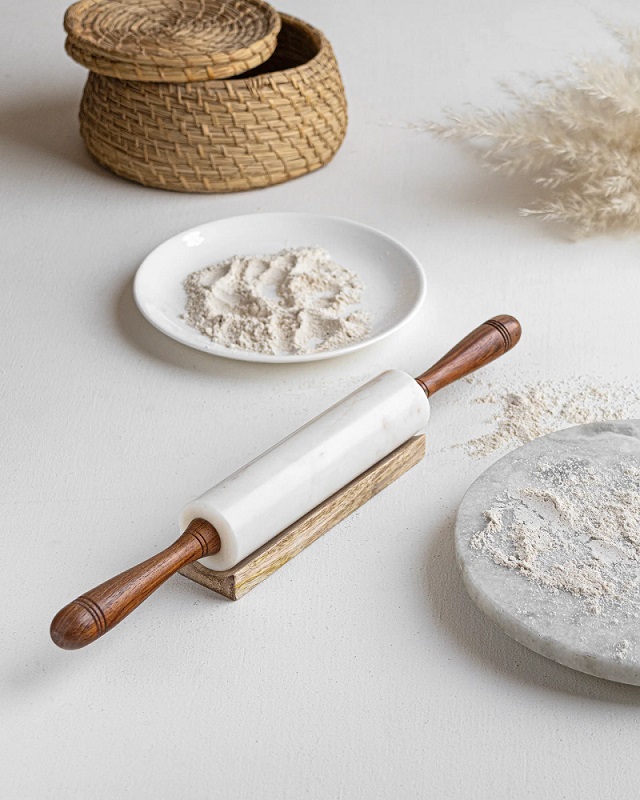When it comes to rolling dough for baking, choosing the right rolling pin can make a big difference in your kitchen experience. Rolling pins come in various materials and designs, but two of the most popular options are the marble rolling pin and the traditional wooden rolling pin. Each has its unique features, advantages, and drawbacks. Understanding these differences can help you decide which one best suits your baking needs.
What Is a Marble Rolling Pin?
A Marble Rolling Pin is made entirely of smooth, polished marble, offering a heavy and cool surface ideal for rolling out dough. The marble’s natural coolness helps keep dough from sticking or warming up, which is especially useful for sensitive dough types like pastry and pie crusts. Because of its dense material, a marble rolling pin applies even pressure without requiring much effort from the baker.
Marble rolling pins are also non-porous, meaning they don’t absorb moisture, odors, or flavors from dough. This makes cleaning easier and reduces the risk of contamination between uses. The sleek, elegant appearance of a marble rolling pin also makes it a beautiful addition to any kitchen.
Traditional Rolling Pin: A Timeless Classic
Traditional rolling pins, most commonly made from wood, have been a kitchen staple for centuries. These rolling pins often feature a simple cylindrical shape with or without handles. They are generally lighter than marble rolling pins, which offers more control and flexibility during rolling.
Wooden rolling pins are appreciated for their warm feel and ease of handling. They can be used on almost any dough type and are typically less expensive than marble rolling pins. With proper care, a wooden rolling pin can last for many years and provide excellent service in the kitchen.
Weight and Pressure: How They Affect Rolling
One of the most noticeable differences between a Marble Rolling Pin and a traditional wooden rolling pin is their weight. Marble rolling pins are significantly heavier, which can be a benefit when rolling dough. The weight allows the marble pin to do much of the work for you by evenly pressing the dough without the need to apply extra force.
In contrast, traditional wooden rolling pins are lighter and require more manual pressure. This can be advantageous for those who want more control, especially when working on delicate or intricate dough shapes. The lighter weight means you can easily adjust pressure as needed for different recipes.
Temperature Control: A Key Advantage of Marble
A standout feature of the Marble Rolling Pin is its ability to stay naturally cool during use. The cool temperature of the marble helps keep dough chilled, which is particularly important for pastry doughs that contain butter or other fats. Warm dough tends to become sticky and harder to work with, so the marble’s cool surface helps maintain the dough’s ideal consistency.
Wooden rolling pins, on the other hand, quickly absorb heat from your hands and the surrounding environment. This can cause the dough to warm up faster, potentially affecting its texture and making it stickier and more challenging to roll out evenly.
Maintenance and Durability Considerations
Marble rolling pins require relatively low maintenance. Because marble is non-porous, it does not absorb oils or odors, and it can be cleaned easily with a damp cloth. However, marble is prone to chipping or cracking if dropped, so it needs to be handled with care.
Traditional wooden rolling pins demand a bit more attention. Wood can absorb moisture and odors, so it should never be soaked or washed in a dishwasher. Instead, they should be hand-washed and occasionally treated with food-safe mineral oil to maintain their finish and prevent drying or cracking. Despite this, a well-cared-for wooden rolling pin can last decades.
Which Rolling Pin Should You Choose?
When to Pick a Marble Rolling Pin
If your baking focuses on pastries, pie crusts, or other doughs that benefit from staying cool, a marble rolling pin is an excellent choice. Its natural coolness and weight make it ideal for rolling dough quickly and evenly without sticking or warming. The smooth surface also means less flour is needed to prevent sticking, which helps maintain dough texture.
Moreover, if you prefer a rolling pin that is visually appealing and easy to clean, the marble rolling pin fits the bill perfectly. It adds a touch of elegance to your kitchen and is highly functional for many baking tasks.
When to Choose a Traditional Rolling Pin
A traditional wooden rolling pin is ideal if you want a versatile, lightweight tool that offers more tactile feedback and control. It works well for various types of dough and is excellent when you want to feel the dough’s thickness and texture as you roll.
Wooden rolling pins are also generally more affordable and easier to replace if damaged. For bakers who prefer a classic kitchen feel and don’t mind a little extra maintenance, the traditional rolling pin remains a favorite.
Final Thoughts
Choosing between a Marble Rolling Pin and a traditional wooden rolling pin ultimately depends on your baking habits, preferences, and priorities. Marble rolling pins excel in maintaining dough temperature and applying even pressure with minimal effort. Traditional rolling pins, meanwhile, provide greater control and a lightweight feel for all-purpose rolling.
Both options have their merits, so consider what matters most to you—whether it's the cool, heavy touch of marble or the warm, classic feel of wood—and select the rolling pin that will make your baking process smoother and more enjoyable.





Comments